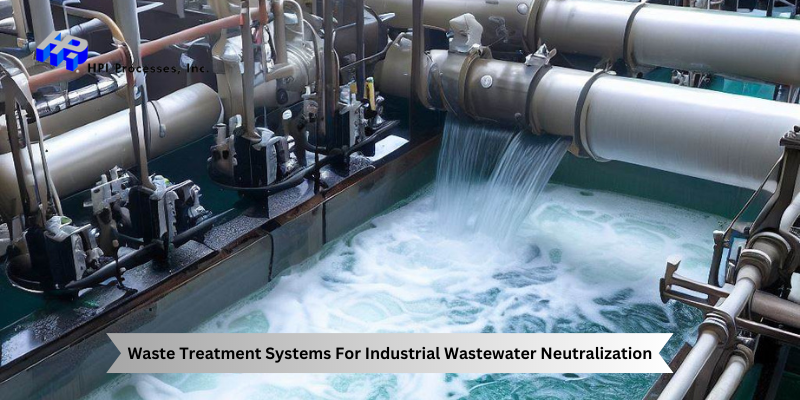It is essential to neutralize pollutants before disposing the wastewater into the environment. Waste treatment systems are one of the most effective ways to neutralize industrial wastewater. This article will discuss the benefits of waste treatment systems for industrial wastewater neutralization.
Introduction
Industrial wastewater is generated by industrial processes and often contains a variety of harmful chemicals and pollutants, including heavy metals, oils & solvents. When released into the environment, these pollutants can contaminate water sources, harm wildlife and pose serious risks To human health. Waste treatment systems are designed to neutralize industrial wastewater by removing pollutants and contaminants. These systems play a crucial role in minimizing the environmental impact of industrial processes and ensuring regulatory compliance.

How Waste Treatment Systems Neutralize Industrial Wastewater?
- Waste treatment systems use various methods to neutralize industrial wastewater.
- Common systems include oil-water separation, coagulation/flocculation/filtration, bioremediation, evaporators & collection pits.
- These systems work by removing pollutants and contaminants from the wastewater, reducing its harmful effects.
Common Types of Waste Treatment Systems:
- Oil-Water Separation: Oil-water separation systems are used to separate oil and other hydrocarbons from industrial wastewater. This is typically achieved through the use of gravity separation or mechanical separation.
- Coagulation/Flocculation/Filtration: Coagulation/flocculation/filtration systems work by adding chemicals to industrial wastewater which causes pollutants to clump together and settle to the bottom. The wastewater is then filtered to remove the pollutants. CoAg2-20A Chemical Water Treatment System is an advanced chemical treatment system that adds chemical coagulant and polymer to the treatment process to efficiently remove suspended solids and emulsified oils from the water stream.
- Bioremediation: Bioremediation systems use naturally occurring microorganisms to break down pollutants in industrial wastewater. This process is often used to treat wastewater containing organic compounds. Industrial wastewater can contain harmful chemicals and pollutants that pose significant environmental and health risks.
- Evaporators: HBG Conventional Water Evaporators Eliminate Excess Industrial Water. Evaporators remove water from industrial wastewater leaving behind concentrated pollutants. This process is often used when wastewater contains high salts or other dissolved solids.
- Collection Pits: Collection pits are used to collect and pre-treat industrial wastewater before it is sent to a waste treatment system. This helps to remove large solids and debris, reducing the load on the waste treatment system.
How does Waste Treatment Systems Help to Minimize Environmental Impact?
- Waste treatment systems help to minimize the environmental impact of industrial processes by removing pollutants and contaminants from wastewater.
- This reduces the risk of contamination of water sources and helps to protect wildlife.
Benefits of Waste Treatment Systems for Industrial Wastewater Neutralization:
- Improved Water Quality Waste treatment systems can significantly improve the quality of wastewater by removing pollutants and contaminants.
- This results in cleaner water that is less harmful to the environment. Compliance with Regulations Many industries are subject to strict regulations governing the treatment and disposal of industrial wastewater.
- Waste treatment systems help businesses comply with these regulations, avoiding fines and legal issues.
Best Practices for Implementing and Maintaining Waste Treatment Systems:
- Implementing and maintaining a waste treatment system can be a complex process.
- However, there are some best practices that businesses can follow to ensure that their system operates effectively and efficiently:
Best Practices for Waste Treatment System Implementation:
- Conduct a thorough assessment of wastewater needs and available treatment options to determine the best system for the business.
- Ensure that the system is properly installed and configured to meet the business’s specific needs.
- Train employees on the proper use and maintenance of the system. Implement a regular testing schedule to ensure that the system is functioning properly.
Importance of Regular Maintenance and Inspection: Regular maintenance and inspection of waste treatment systems are critical to their long-term effectiveness. The following are some best practices to consider:
- Conduct regular maintenance on the system, including cleaning and repair work: Conduct routine inspections to identify and address potential issues before they become significant problems. Train employees to identify potential problems and notify management promptly if any are identified.
- Proper Handling of Hazardous Materials: Proper handling of hazardous materials is essential to waste treatment systems’ safe and effective operation. It is essential that businesses follow all applicable regulations regarding the handling and disposal of hazardous materials. This includes ensuring that employees are properly trained on handling and disposing of hazardous materials and that the business has appropriate safety equipment and procedures in place.
Conclusion
The benefits of waste treatment systems for industrial wastewater neutralization cannot be overstated. These systems help businesses to comply with regulations, reduce environmental impact, and minimize the risk of fines and legal action. By implementing and maintaining a waste treatment system, businesses can protect their bottom line, the environment, and the health of their employees and the public. With proper planning, implementation, and maintenance, a waste treatment system can be an effective and efficient way to manage industrial wastewater.
